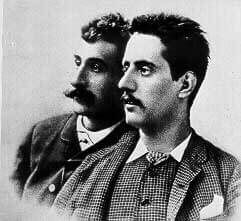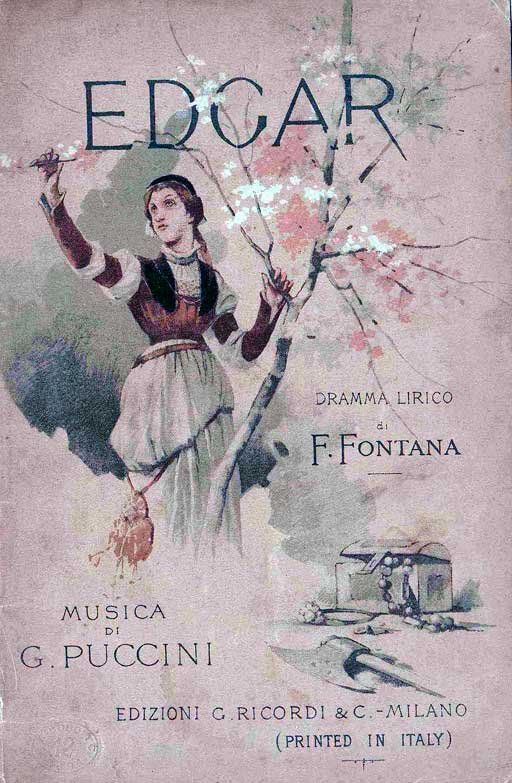Puccini A to Z – E as in Edgar
E as in Edgar
After the good response of Le Villi in 1884, editor Giulio Ricordi, commissioned Puccini a new opera, to be produced and performed at the Teatro alla Scala in Milan. The choice of the story landed on Edgar, a tragedy inspired by La coupe et les lèvres by Alfred de Musset, turned into an opera libretto by Ferdinando Fontana.
Fontana took his liberties: Frank became Edgar, Deidamia (the good) became Fidelia and Belcolore (the bad) became Tigrana.

F. Fontana e G.Puccini
Changing the names of the female characters was an old trick to give the audience an immediate idea of who was whom. Furthermore, the action was moved from the Tirol to the Flanders of the 1300s.
Puccini worked on it for four years and the opera premiered in 1889 with conductor Franco Faccio on the podium. It wasn’t a rave success. The critics heavily criticized the libretto, but the young Puccini got his share as well. He was attacked on the basis of “borrowing” too much from Bizet (after all, if you read the plot the similarities between Edgar and Don José are uncanny), Gounod and Ponchielli. Ricordi had to defend him from the cda of his own company, who wanted to suspend the payments to the composer. The opera was dropped after only three performances.
The revision process
Puccini, pushed by Ricordi, began a first revision of the score for a possible revival, cutting part of the fourth act, but stretching the second. A vocal score of this version was published in 1890, but the opera was only to see the stage again in 1891. This time, in his Lucca, Puccini earned a full success.
After the Lucca performances, Puccini cut the fourth act entirely and considerably reduced the second act. In this new revision, the opera was staged in Ferrara, Turin, Madrid (at Teatro Real conducted by the great Luigi Mancinelli) and Brescia. It was not a success and Edgar saw the light of a new stage only 13 years later.

In this new form, the opera was staged at the Teatro Colón in Buenos Aires, only to disappear for another 15 years. Edgar saw a new production in Malta in 1920. Then a radio performance in Italy in 1935 and finally it was on stage again on Christmas Eve, 1944 at the Teatro Lirico of Milan.
Puccini himself criticized Edgar in more than one occasion. On a copy of the vocal score he wrote quite a caustic comment: “Edgar – E Dio ti GuARdi da quest’opera” (God save you from this opera). He was particularly critic of the core points of the three acts version, especially of the newly composed finale of the second act, defining it as the “most horrible thing ever written“.
The last revision in the early 1900s had the cascading effect of splitting the autograph: the first and third act stayed with Ricordi, while the second and the fourth remained at Puccini’s house. This was an impediment to represent the opera in its original 1889 version. The original scores were reunited only in 2007 and the opera was eventually performed at the Teatro Regio of Turin.
A curiosity: Toscanini used the Requiem of the fourth act for Puccini’s funeral in Milan.
Synopsys
The Flanders, 1302
Act I
Dawn, a village in the Flanders. The young Edgar, despite his affection for Fidelia, can’t resist the charm of Tigrana, a gypsy with a mysterious past. Tigrana sings a blaspheme song in the middle of mass, causing the resentment of the villagers. Edgar runs in her defense, burns his own house and, after leaving Fidelia, runs away with Tigrana.
Act II
Edgar and Tigrana live together in a castle, going from one party to another. Soon enough, though, the memories of his old house and of Fidelia start coming back. When he hears the noise of military drums accompanying the soldiers to the battle field, Edgar feels the desire to reinstate himself. Tigrana tries to change his mind, but he decides it’s time for him to join the soldiers led by Frank, Fidelia’s brother (who had also been seduced by Tigrana in the past).
Act III
The Flemish army wins the battle, but numerous lives are left in the field; Edgar is among the missing and in the village they begin preparations for solemn burials in his honor. Only a mysterious friar doesn’t join them, remembering the flaws of Edgar’s life. Fidelia, indignantly, comes in defense of her ex-lover and leaves the stage.
At the end of the ceremony, Tigrana comes in, weeping for his lover’s death. The friar approaches her, offering gold and precious stones in exchange for her slandering of Edgar’s name. The gypsy goes as far as publicly declaring that Edgar even had in mind to betray his Country. Some soldiers react by trying to profane Edgar’s corpse, but they step back in awe when all they find is his armor. The friar takes off his clothes and reveals himself as Edgar. He angrily turns to Tigrana, pointing her out to the public contempt.
Act IV
Dawn. After a sleepless night, Fidelia decides to put an end to her own life. As she goes out on the balcony to admire the roses one last time, she sees Edgar along with her brother Frank and faints. When she wakes up, Edgar is by her side, explains to her why he had to fake his own death and tells her they will get married that very same day.
As he leaves her to ready the ceremony, Tigrana comes in and stabs Fidelia. Edgar comes back and Fidelia dies in his arms, while the villagers capture Tigrana and take her to the scaffold to be beheaded.
The three acts version
Not much changes in terms of the plot in the three acts version: with the cut of act fourth a different version of the finale was worked out. Fidelia does not leave the stage in act three and when Edgar reveals himself, she runs towards him to hug him. But Tigrana is faster and stabs her to death, leaving her to die in Edgar’s arms.
Edgar: discography
1967 - Fulham Municipal Orchestra
Conductor – Joseph Vandernoot
Orchestra – Fulham Municipal Orchestra
Chorus – Hammersmith Opera
Fidelia – Angela Rubini
Edgar – Edward Byles
Tigrana – Doreen Doyle
Frank – Michael Rippon
Gualtiero – Graham Nicholls
1971 - RAI Orchestra of Turin
Conductor – Carlo Felice Cillario
Orchestra – RAI Torino
Chorus – RAI Torino
Fidelia – Mietta Sighele
Edgar – Veriano Luchetti
Tigrana – Biancamaria Casoni
Frank – Renzo Scorsoni
Gualtiero – Alfredo Colella
1972 - BBC Northern Symphony Orchestra
Conductor – Bryan Balkwill
Orchestra – BBC Northern Symphony Orchestra
Chorus – BBC Northern Singers
Fidelia – Pauline Tinsley
Edgar – Ronald Dowd
Tigrana – Marjorie Biggar
Frank – Terence Sharpe
Gualtiero – Jolyon Dodgson
1973 - Wiener Volksoper
Conductor – Anton Guadagno
Orchestra – Wiener Volksoper
Chorus – Wiener Academie Kammerchor
Edgar – Barry Morell
Tigrana – Nancy Stokes
Frank – Walker Wyatt
1977 - Opera Orchestra of New York
Conductor – Eve Queler
Orchestra – Opera Orchestra of New York
Chorus – Schola Cantorum of New York – New York City Opera Children’s Chorus
Fidelia – Renata Scotto
Edgar – Carlo Bergonzi
Tigrana – Gwendolyn Killebrew
Frank – Vincenzo Sardinero
Gualtiero – Mark Munkittrick
1984 - New Stockholm Chamber Orchestra
Conductor – Jan Latham-Koenig
Orchestra – New Stockholm Chamber Orchestra
Fidelia – Zsuzsanna Dénes
Edgar – Raimundo Mettre
Tigrana – Helrun Gardow
Frank – Gianluigi Senici
Gualtiero – Aldo Poramente
2002 - Orchestre National de France
Conductor – Yoel Levi
Orchestra – Orchestre National de France
Chorus – Maitrise de Radio France
Fidelia – Julia Varady
Edgar – Carl Tanner
Tigrana – Mary Ann McCormick
Frank – Dalibor Jenis
Gualtiero – Carlo Cigni
2004 - Chamber Orchestra of Philadelphia
Conductor – Christofer Macatsoris
Orchestra – Chamber Orchestra of Philadelphia
Chorus – New Jersey Master Chorale – Wayne Richmond Children Song of New Jersey
Fidelia – Latonia Moore
Edgar – James Valenti
Tigrana – Jennifer G. Hsiung
Frank – Yungbae Yang
Gualtiero – Matthew Arnold
2004 - Orchestra Filarmonica Mediterranea
Conductor – Tamás Pál
Orchestra – Orchestra Filarmonica Mediterranea
Chorus – Coro di voci bianche dell’Opera di Brasov
Fidelia – Montserrat Marti
Edgar – Dario Balzanelli
Tigrana – Halla Margret
Frank – Andrea Rola
Gualtiero – Giovanni Tarasconi
2006 - Santa Cecilia Orchestra
Conductor – Alberto Veronesi
Orchestra – Santa Cecilia
Chorus – Santa Cecilia
Fidelia – Adriana Damato (d’Amato)
Edgar – Plácido Domingo
Tigrana – Marianne Cornetti
Frank – Juan (Joan) Pons
Gualtiero – Rafal Siwek
2008 - Teatro Regio of Turin
Conductor – Yoram David
Orchestra – Teatro Regio di Torino
Chorus – Teatro Regio di Torino
Fidelia – Amarilli Nizza
Edgar – José Cura
Tigrana – Julia Gertseva
Frank – Marco Vratogna
Gualtiero – Carlo Cigni
2008 - Opera Orchestra of New York
Conductor – Eve Queler
Orchestra – Opera Orchestra of New York
Chorus – New York Choral Society
Fidelia – Latonia Moore
Edgar – Marcello Giordani
Tigrana – Jennifer Larmore
Frank – Stephen Gaertner
Gualtiero – Giovanni Guagliardo
Final thoughts
It might not be Puccini’s best opera, partially due to the libretto partially by Puccini own inexperience. Naturally, our judgment cannot escape from the knowledge of the Puccini that was to come and a comparison is almost unavoidable. However, the genius is already there. The fingerprints that we have become so familiar with in later masterpieces are more than just peaking in this drama, worth more than a simple casual listening.
I’ll leave you to a couple of the most famous arias from this opera: “Addio, mio dolce amor” sung by Renata Scotto and “Orgia, chimera dall’occhio vitreo” sung by Carlo Bergonzi.
Sources and resources:
Opera Classics Library Puccini Companion: The Glorious Dozen by Fisher D. Burton
List of recordings on operadis-opera-discography.org.uk
Three acts version libretto (in Italian)
Poster by Al Pereira (Own work) [Public domain], via Wikimedia Commons
Picture of Fontana and Puccini by Werther W at it.wikipedia [Public domain], from Wikimedia Commons
About the author

Gianmaria Griglio
Composer and conductor, Gianmaria Griglio is the co-founder and Artistic Director of ARTax Music.
Interested in some more music? Take a look at this series!





